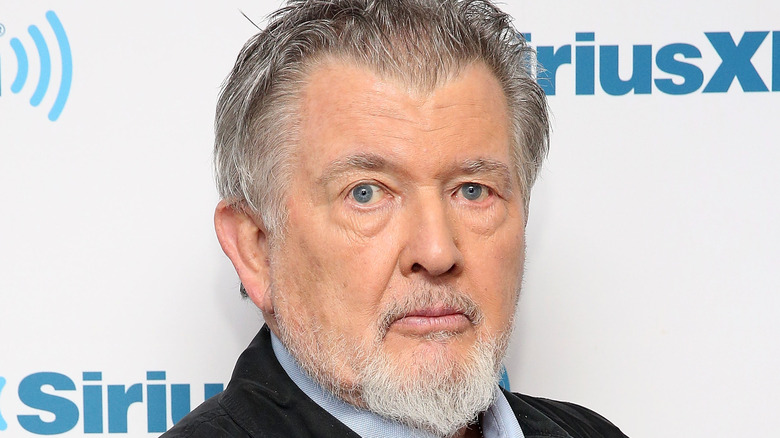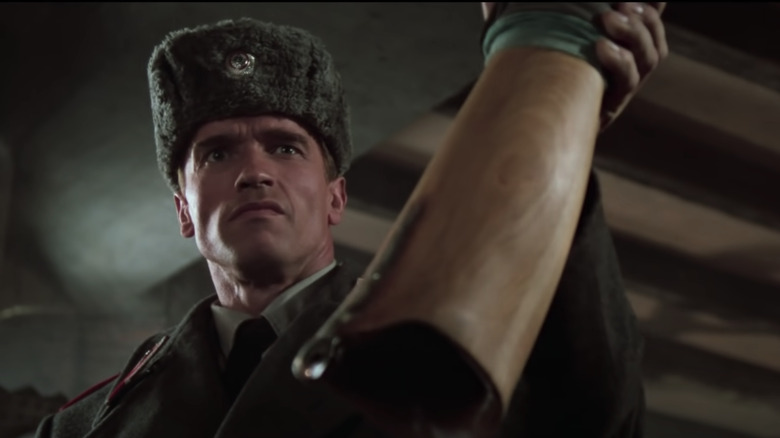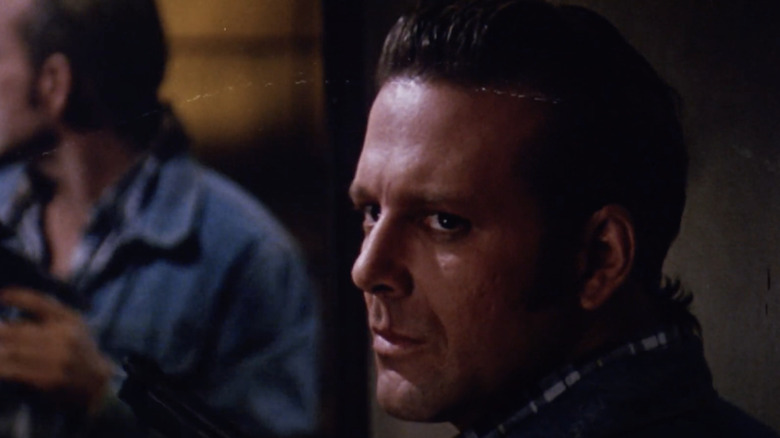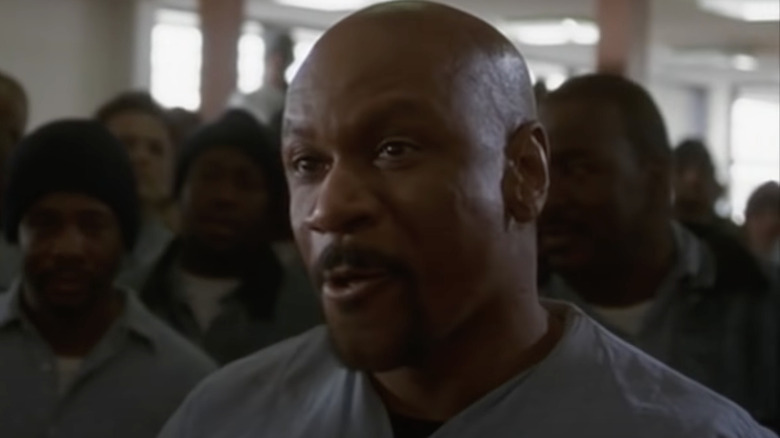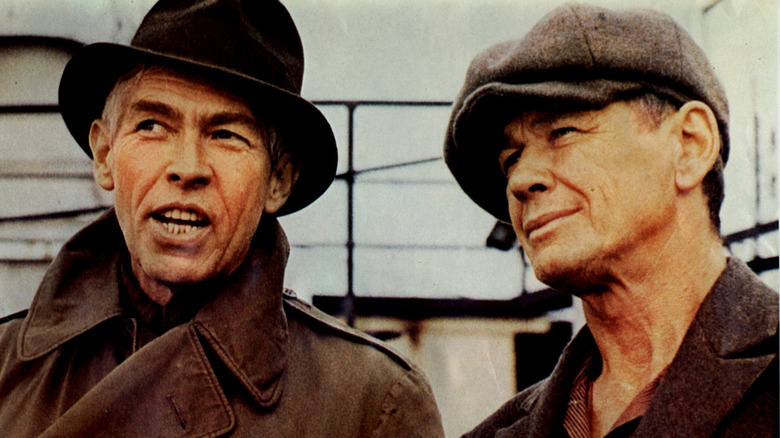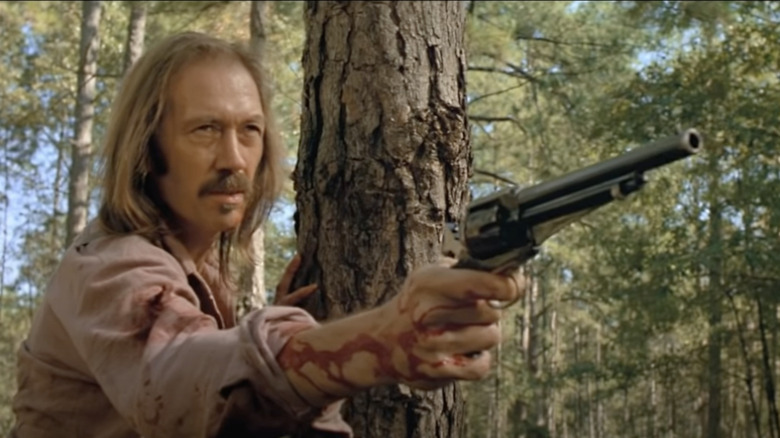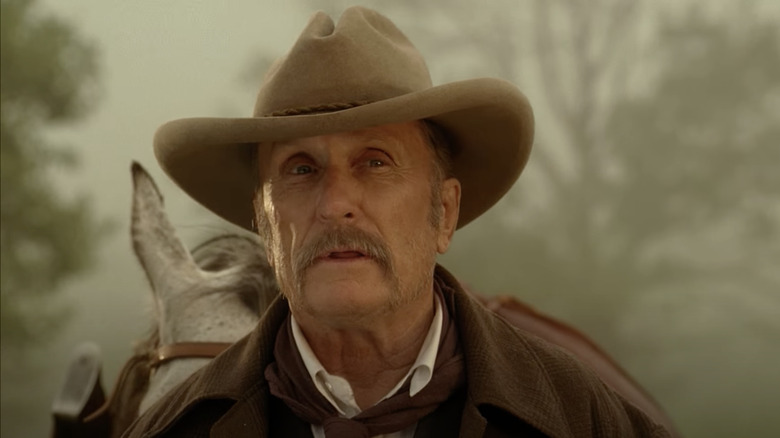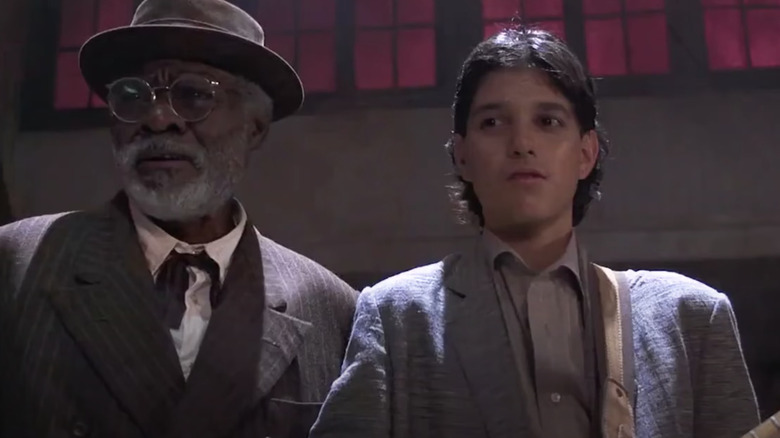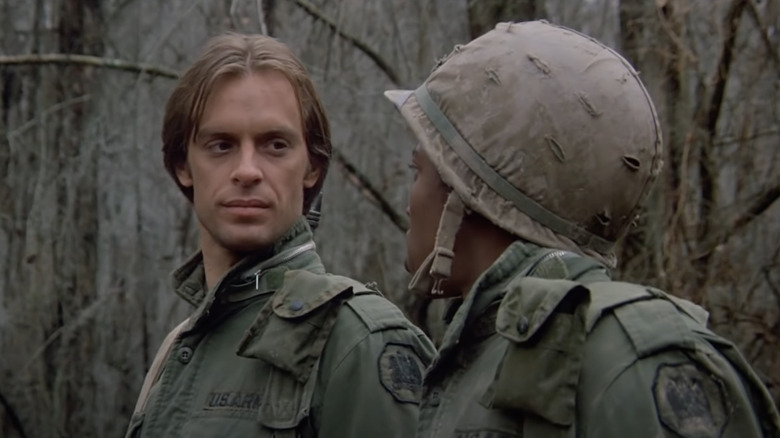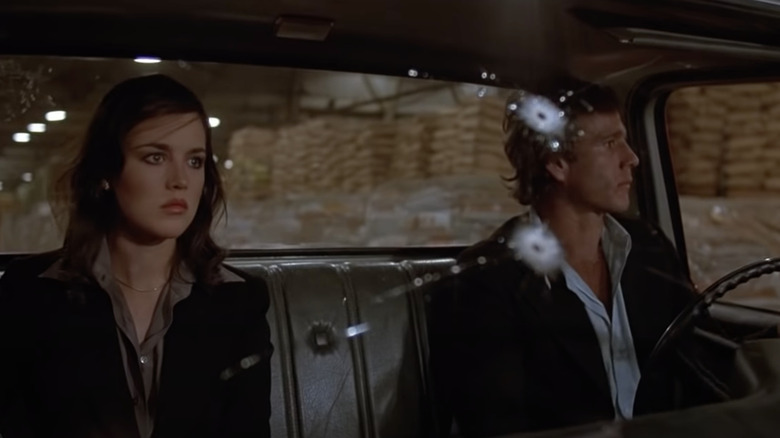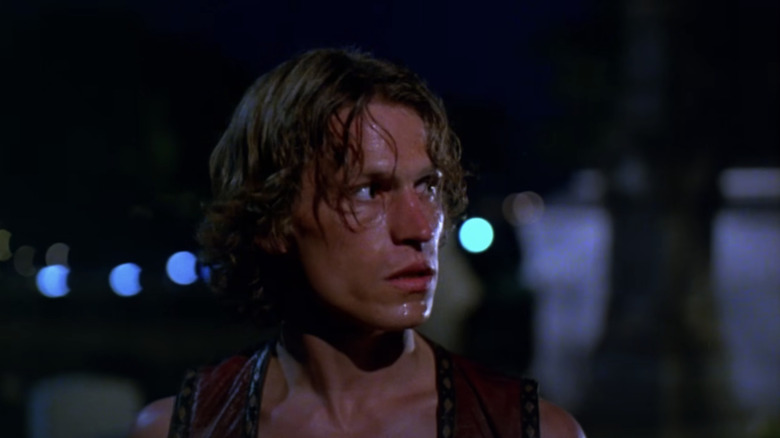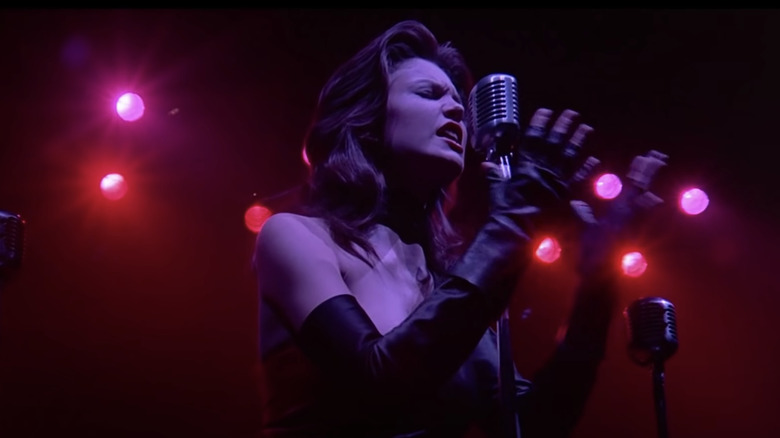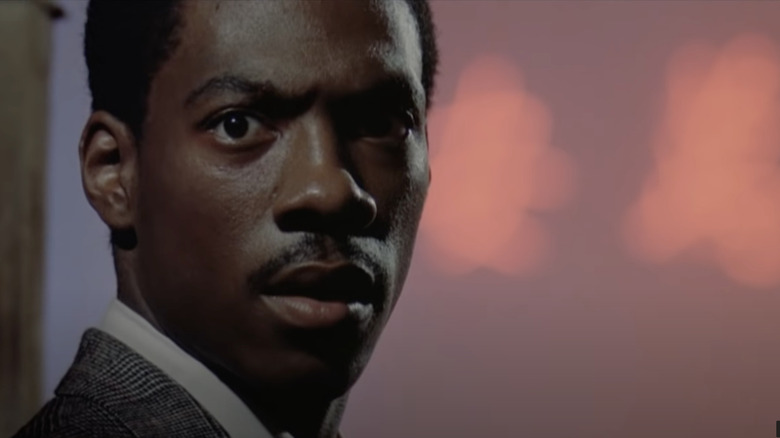Walter Hill's Best Movies
If Walter Hill had only developed and produced the "Alien" films, or had only produced "Tales from the Crypt" for HBO, or had just written the script to Sam Peckinpah's "The Getaway" or directed the first episode of "Deadwood," his place in Hollywood history would be secure. Instead, these are ancillary achievements in a filmmaking career that spans seven decades.
Born in California in 1942, as a boy Hill was obsessed with action movies, musicals, and westerns. That passion for genre film never left him, even as he studied the new wave of European and international pictures coming to the United States in the 1960s. Many of his best films showcase a blending of these sensibilities, B-movie plots infused with minimalist, existential poetry. After attending art school in Mexico City and studying art and history at Michigan State University, Hill returned home to California and began working in educational films. Soon, though, he was writing feature scripts and working as a second assistant director on such flicks as "Bullitt" and "The Thomas Crown Affair." In 1973 he met Columbia Pictures producer Larry Gordon, who offered him the chance to re-write and direct a sports movie script that he had. That film became Hill's debut, 1975's "Hard Times" starring Charles Bronson, and the rest is history.
From the 1970s to the 2020s, Hill has written and directed hard-hitting films in nearly every genre, but certain themes repeat over and over in his works: The pleasure of watching skilled professionals work; groups of disparate characters (usually men) forced to work together; solitary warriors at odds with society. These themes and more permeate Walter Hill's best movies.
Red Heat (1988)
East meets West on the streets of Chicago in 1988's "Red Heat," a Cold War relic that was out of date within just a few years of its release, but no less entertaining. Arnold Schwarzenegger stars as Ivan Danko, a Soviet police detective on the hunt for his partner's murderer. His quest for vengeance takes him from Moscow to the decadent capitalist streets of the Windy City, where he forms an uneasy alliance with loose cannon cop Art Ridzik, played by future celebrity pot farmer Jim Belushi. While these men are very different in terms of disposition, body type, and political ideologies, they share a passion for justice and a callous disregard for civil liberties.
This was right in the middle of Schwarzenegger's imperial period, between the first "Terminator" film and "Last Action Hero," when his superhuman physique was the best special effect money could buy; he begins the film wearing nothing but a loincloth. Belushi, too, was at the relative peak of his movie stardom.
The film may be blatantly trying to recapture the prickly chemistry of Hill's own "48 Hrs.," and is hampered by a rote drug running shoot-em-up plot that could have been borrowed from any number of 1980s action movies, but remains mandatory viewing for any fan of Ahnuld-in-his-prime. Even if it doesn't help things that, even though Belushi is supposed to be the funny one, Schwarzenegger beats him laugh for laugh.
Johnny Handsome (1989)
Johnny Handsome is a cruel nickname given to John Sedley (Mickey Rourke), a small-time hood whose face has been deformed since birth. When a robbery goes wrong and he is double-crossed by a pair of lowlifes (Ellen Barkin and Lance Henricksen), John is given a strange proposition in order to beat jail time: volunteer for an experimental plastic surgery procedure (led by a doctor played by Forrest Whittaker) in order to repair his face.
The procedure works, and John's nickname goes from ironic to sincere. He is out on parole, has a straight job down at the docks, and a new girlfriend (Elizabeth McGovern) who knows nothing of his previous life. But the scars of being looked down upon his entire life don't heal so easily, and John is soon consumed with a plot for revenge.
This neon-soaked film noir operates on a kind of dream logic, helped along by the New Orleans setting, Ry Cooder's swampy score, and a stacked cast that also includes Morgan Freeman as a police lieutenant keeping tabs on John. The film bears a strong resemblance in tone and style to Hill's other 1989 project, the first episode of HBO's "Tales from the Crypt," which was also a noir-ish, New Orleans-set morality tale.
Undisputed (2002)
As pulpy as they come, Hill's 2002 film "Undisputed" takes a look at prison movies, then takes a look at boxing movies, and decides to have both at once. Loosely inspired by Mike Tyson's prison stint for sexual assault in 1992, Ving Rhames plays George "Iceman" Chambers, the reigning heavyweight champ of the world, now in a high-security Southwestern prison after a rape conviction.
As it just so happens, this prison has an inmate boxing league, with convicted murderer Monroe Hutchen (Wesley Snipes) as its undefeated champion. Incarcerated gangster Mendy Ripstein (Peter Falk, in one of his final roles) has the idea to pit the two champions against one another, the boisterous Chambers and the softspoken Monroe, to see once and for all which of them is ... well, you know.
Snipes and Rhames have enough charisma combined to power a small city, and the film crucially never fully casts one of them as the villain, giving sympathies to both men alongside their less savory qualities. The film fared poorly at the box office, but found its audience on home video and inspired three (mostly unrelated) direct-to-video sequels starring British action star Scott Adkins.
Hard Times (1975)
The life and times of a Depression-era bare knuckle brawler (Charles Bronson) and his fast-talking manager (James Coburn), 1975's "Hard Times" was Hill's first film as a director. Having made his name as a screenwriter, Hill was given the chance to write and direct a feature at Columbia Pictures. Producer Larry Gordon had optioned a screenplay about streetfighters in modern day San Pedro, California. Hill rewrote the script as a period piece, set in Louisiana during the Great Depression, to give it a more mythic feel — "a tale told around a campfire," as Hill would describe it years later.
In the context of his entire career, "Hard Times" is something of a Rosetta Stone; many of his pet themes and ideas are already present. Other than a lonely housewife played by Bronson's real-life paramour Jill Ireland, the film is about men and takes place in a hard-scrabble masculine world not unlike "Geronimo" and "Undisputed." Bronson and Coburn are Hill's prototypical duo, one taciturn and the other gregarious, as later seen in "Red Heat" and "48 Hrs." Then there's the New Orleans setting, providing a heaping dose of atmosphere and intrigue, a lesson Hill would keep in mind 14 years later for "Johnny Handsome" and "Tales From the Crypt."
The Long Riders (1980)
Though many of his previous works had bore the influence of Westerns, 1980's "The Long Riders" was Hill's first true oater. Based on a play written by Stacy Keach about the James-Younger gang, the film uses sepia-toned photography and slow motion photography to give the feel of an oft-told legend.
But it's most audacious conceit is in the casting, which had the gang's many siblings played by real-life brothers: Stacy and James Keach as Frank and Jesse James; David, Keith, and Robert Carradine as the Younger brothers; Dennis and Randy Quaid as Ed and Clell Miller; and Christopher and Nicholas Guest as Charlie and Robert Ford.
With so many actors in cowboy hats riding around, the film can feel a bit diffuse, without a point of view beyond its own Western revivalism and bursts of bloody violence that would make audiences of a previous generation gasp. Stacy Keach's Jesse James and David Carradine's Cole Younger stand out from the pack (perhaps because they were the biggest stars in the cast at the time), with Cole's romancing of famed frontier madam Belle Starr (Pamela Reed) contributing to the gang's eventual downfall. Sandwiched between "The Warriors" and "48 Hrs.," this is an oft-overlooked effort in Hill's oeuvre, but deserves a second look for its spare, unsentimental take on a famous tale.
Broken Trail (2006)
Hill returned to television and to the Western in 2004, directing the pilot episode of the critically-acclaimed HBO series "Deadwood." Soon after, he became attached to a new Western project being developed by Robert Duvall and writer Alan Geoffrion. Originally planned as a feature, "Broken Trail" was sold to AMC and refashioned into a four-hour miniseries in 2006.
Duvall stars as old cowboy Prent, who ropes his nephew Tom (Thomas Hayden Church) into a business deal, driving a herd of horses from Oregon to Wyoming to be sold to the British military. Along the way, they become the unlikely stewards of five young Chinese women who were to be sold off to a Wyoming madam (Rusty Schwimmer). Seeking safe passage for all in their care, Prent and Tom must contend with not only the harsh frontier conditions, but a hired gun sent to retrieve the Chinese girls by any means necessary.
When expanding the story from a feature into a miniseries, Hill insisted on beefing up the roles of the young Chinese women, who originally were nearly mute. He felt that the story would be most effectively and uniquely told through their eyes. Indeed, the miniseries is most notable for the ways it presents a frontier that was brutal to marginalized groups, from the constant threat of violence against sex workers and women in general, to the perilous legal status of Chinese immigrants, to the biological warfare waged against Native Americans (in the person of an odious cowboy named Smallpox Bob). Even the era's toilet paper (or "therapeutic papers") was rough and inhospitable.
Crossroads (1986)
Eugene, a teenage guitar prodigy (Ralph Macchio) studying classical music at Julliard, becomes obsessed with blues music — specifically, a long-lost never-recorded song by real-life Mississippi blues legend Robert Johnson, who is famously rumored to have sold his soul to the devil. He enlists the help of Willie Brown (Joe Seneca), an elderly harmonica player who claims to have played with Johnson and knows the lost song. Willie agrees to help, but only if Eugene takes him to Mississippi. While Eugene dreams of musical stardom, Willie's quest has a different aim: to win his own soul back from Ol' Scratch.
In its broad strokes, 1986's "Crossroads" bears a certain resemblance to Macchio's 1984 hit "The Karate Kid," just with guitars subbed in for crane kicks. Hill recognized the similarities. "There's a mentor relationship, a minority mentor, plus Ralph's persona," he told NME years later. But beyond its star and some echoes in the premise, including a climactic musical showdown between Eugene and the devil's own guitarist (hair metal legend Steve Vai), the two films have little in common. Macchio and Seneca make a much more antagonistic pair than he and Pat Morita; Eugene has a bratty streak that cuts effectively against Macchio's wide-eyed persona, and the film's Southern backroads combined with Ry Cooder's bluesy score create an appropriately spooky atmosphere even before Satan makes an appearance.
Southern Comfort (1981)
A group of National Guardsmen are on a weekend training exercise in the swamps of Louisiana. One of them spies some Cajun hunters in the distance; goofing around, he fires his rifle, loaded with blanks, in their direction. They return fire with live ammo, and before anyone knows what's happened, the platoon's commanding officer is dead and these weekend warriors (David Carradine, T.K. Carter, and Powers Boothe) are lost in territory that has become frighteningly hostile.
The Vietnam parallels in 1981's "Southern Comfort," in which American military might is brought to its knees by guerrilla fighters striking from the bush, are not subtle, though that wasn't necessarily Hill's intention; he would explore a similar conflict from a much more sympathetic angle a decade or so later with "Geronimo: An American Legend." Hill and co-writers David Giler and Michael Kane craft a taut, unrelenting thriller, combining the backwoods horror of "Deliverance" with the politics and mystical overtones of "Apocalypse Now." The latter film's climactic slaughter of a water buffalo is even echoed here with scenes of a hog being butchered, as the last survivors think they have finally made it to safety. There's some "Alien" DNA in the film as well, with Carradine and Boothe as regular workaday guys forced to fight for survival against an implacable foe.
The Driver (1978)
The Driver (Ryan O'Neal) drives. That's all he does; he's a getaway driver. He doesn't even have a name. No one, in fact, has names in Hill's script for 1978's "The Driver." Everyone is named for what they do. The Player (Isabelle Adjani) is a gambler who gets caught up in the Driver's world when she witnesses him at a job gone bad. The Connection (Ronee Blakely) is the middlewoman and fence for The Driver; if you need him, you go through her. And The Detective (Bruce Dern) is the man trying to hunt The Driver down.
Hill's second feature is perhaps the purest distillation of his twin influences, American B-movies and the European New Wave, working in tandem. The plot and characters are boilerplate crime picture stuff, but when stripped of anything extraneous, even their names, the film takes on an archetypal, existential cool.
While Dern carries most of the film's dialogue as the chatty, neurotic Detective, O'Neal holds his own, and even excels, as the nearly silent Driver — another of Hill's opposites-attract duos. Though the film underperformed at the box office, it was generally well-received by critics in the United States and Europe, and its combination of stylish minimalism and high octane car action influenced an entire generation of filmmakers, most notably Nicholas Winding Refn ("Drive") and Edgar Wright ("Baby Driver").
The Warriors (1979)
Loosely inspired by the Sol Yurick novel of the same name, but more directly based on the ancient Greek tale of Anabasis, "The Warriors" turns the world of New York street gangs into a fantasia of wild costumes and comic book violence. The titular gang (led by Michael Beck's Swan), dressed shirtless in matching leather vests, heads into the city for a peace summit led by would-be messiah Cyrus (Roger Hill). But when Cyrus is gunned down, the Warriors are fingered for the murder. Now they have to journey 27 miles back across enemy turf to their home on Coney Island, with the cops and 60,000 gang members on their trail.
There's an electric tension in the movie between the gritty naturalism of its setting and the colorful expressiveness of everything else, with young men dressed in kabuki makeup and baseball uniforms (AKA the Baseball Furies) fighting the Warriors through the streets and subways of pre-gentrified New York City while a radio DJ (Lynne Thigpen) narrates the action, unseen but for a pair of red lips.
Hill's focus is on the action; there is little room for any moralizing about wayward youth, or even acknowledgment of an outside world. In one telling moment toward the end, Swan and Mercy (Deborah Van Valkenburg), a civilian who got caught up in the action, sit on a subway train, battered and exhausted, across from a group of teens coming home from prom. The two groups look like they came from different planets, and in a way they did. The film is the very definition of a cult classic; either you are in the gang, or you're not. Can you dig it?!
Streets of Fire (1984)
Like a rockabilly cousin to "The Warriors," 1984's "Streets of Fire" takes place in a heightened, stylized universe, splitting the difference between the 1950s and the 1980s, set in the bad part of an unnamed studio backlot city. Rock star Ellen Aim (an impossibly young Diane Lane) is kidnapped by a motorcycle gang led by the psychotic Raven (an impossibly young Willem Defoe). Ellen's manager/boyfriend Billy Fish (Rick Moranis) pays local tough guy Tom Cody (Michael Pare) to rescue her, not realizing that Tom is Ellen's old flame.
Featuring a '50s rock and roll score by Ry Cooder and original songs by Tom Petty, Stevie Nicks, and Meatloaf collaborator Jim Steinman, "Streets of Fire" is as close to a full-on musical as Hill has ever attempted. As with many of his best films, it was not an immediate success but became quietly influential, especially in the burgeoning cyberpunk and anime genres.
Like "The Warriors," the film doesn't attempt to explain its fantasy world, other than the pre-credits descriptor "A rock and roll fable." The dialogue is all hard-boiled patter that sounds better in some actors' mouths than others; while Moranis and Amy Madigan (as Tom's hard-nosed sidekick) make a meal out of their lines, Pare often sounds as if he isn't quite in on the joke. It is also notable that this is perhaps Hill's largest female cast, including Lane, Madigan, Deborah Van Valkenburg (from "The Warriors") as Tom's sister, and future "Rugrats" voice actor Elizabeth Daily as an eager Ellen Aim fan.
48 Hrs.
"48 Hrs." was Hill's highest-grossing film to date in 1982, a bona fide smash hit, and today is second only to its own 1990 sequel. The film was an immediate critical hit as well, a rare success for Hill that didn't take years for people to catch up to it.
When hardened criminal Albert Ganz (James Remar) escapes from a prison chain gang and starts a murderous rampage through San Francisco searching for his stolen loot, rogue detective Jack Cates (Nick Nolte) arranges for Ganz's incarcerated old partner Reggie Hammond (Eddie Murphy) to be released into his custody for 48 hours to aid in the manhunt. But Reggie plans to milk his short-lived freedom for all it's worth.
The idea for the film came from Larry Gordon, Hill's "Hard Times" producer; Hill wrote the screenplay with Larry Gross, whom he would re-team with for "Streets of Fire" and "Geronimo." Studio meddling plagued the production, as then-Paramount president Michael Eisner was concerned that the film was not funny enough, that the violence of the action scenes would sap the comedy, and that Eddie Murphy was miscast as Reggie.
Eisner was, of course, wrong on all three counts, as Hill's insistence on treating the action as seriously as the comedy would influence Hollywood blockbusters for years to come, shaping Eddie Murphy's star persona and leaving its mark on everything from Murphy's own "Beverly Hills Cop" series, to "Lethal Weapon" and "Rush Hour," to even more recently "The Falcon and the Winter Soldier."
